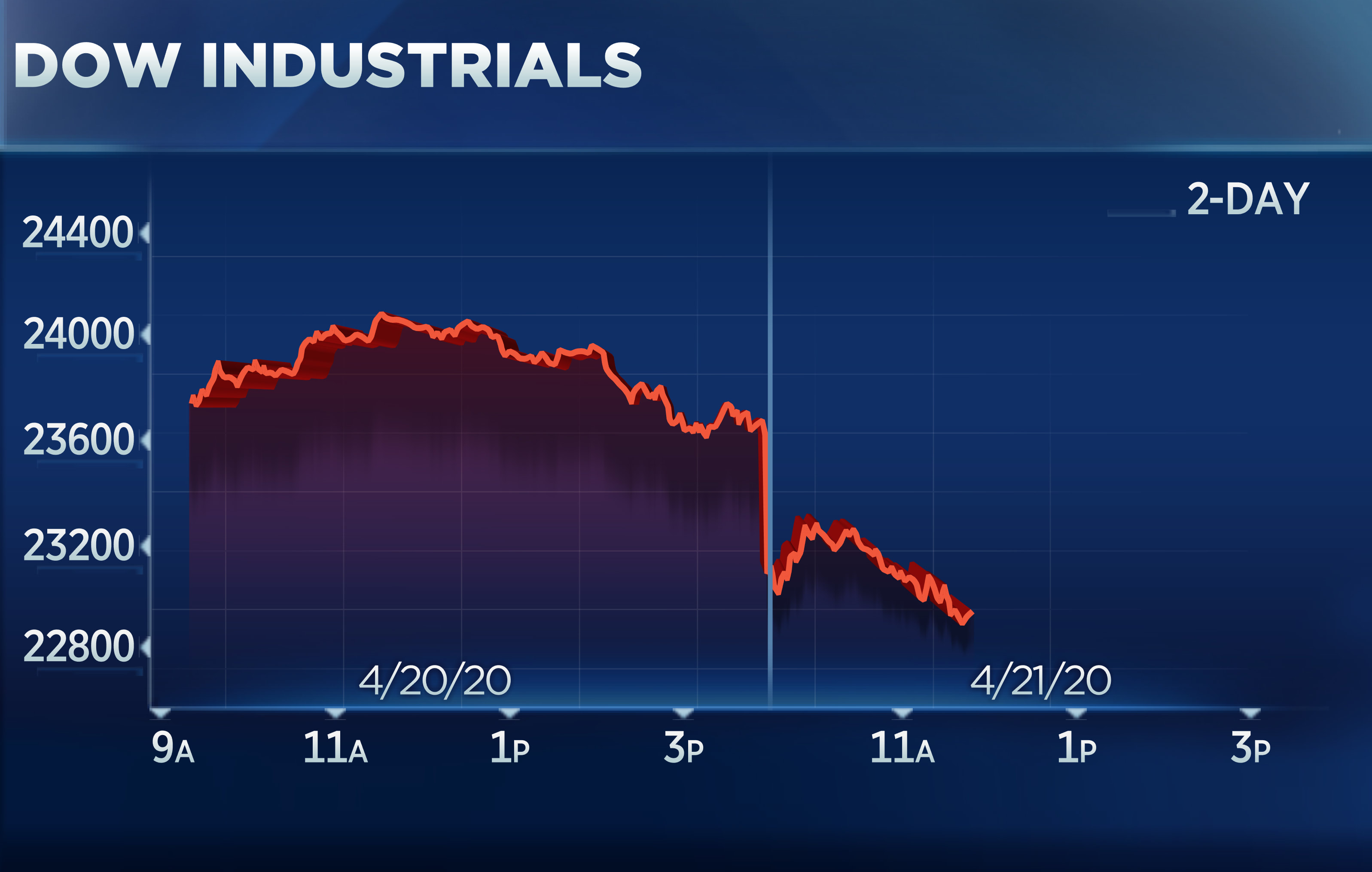
U.S. stocks fell sharply once again on Tuesday as oil prices continued their unprecedented wipeout.
The Dow Jones Industrial Average slid 622 points, or more than 2%. Tuesday’s losses brought the Dow’s two-day decline to more than 1,000 points. The S&P 500 dropped 3.1% while the Nasdaq Composite fell 3.6%. (Click here for the latest market news.)
Traders were focused on the strange happenings with oil futures once again, which raised concern about deep losses for the energy industry hitting the U.S. economy even further. On Monday, the May contract for oil futures expiring Tuesday fell to zero and then went to an actual negative price, meaning producers would pay for someone to take the oil off their hands. The bizarre move has to do with the fact that because of the coronavirus shutdowns, big buyers of oil like refineries don’t need any more oil because their tanks are nearly filled.
That May contract clawed back into the black in early trading on Tuesday.
“If we ever needed a reminder for the extent of the abrupt decline in global economic activity, it is the fact that WTI oil futures saw a negative price,” said Tom Lee, head of research at Fundstrat Global Adivsors, in a note. “But oil is a residual issue of the broader global “stay at home” and this situation will not change until Western nations and US states begin opening up. And they cannot open up until each jurisdiction feels they have a handle on the healthcare crisis.”
More concerning to traders on Tuesday was the selling now occurring in later month contracts for oil futures. The more actively traded June oil contract was down 41% at $12.13 Tuesday. That contract expires on May 19.
The United States Oil Fund, an exchange-traded security for the retail investors which buys oil futures, tanked 28% to just $2.70. Major oil stocks Exxon Mobil and Chevron were down 0.4% and 2.2%, respectively.
President Donald Trump tweeted he instructed the Energy and Treasury departments to “formulate a plan which will make funds available so that these very important companies and jobs will be secured long into the future.”
Not helping sentiment were shares of IBM, which slipped 5% after the company reported a 3.4% decline in revenue in the first quarter from a year ago amid the spread of coronavirus. Salesforce and Oracle both fell more than 4% after IBM said its software and global business segments suffered from strong headwinds in the last two weeks of March due to the virus. Coca-Cola, Netflix, and Chipotle are on deck to report earnings on Tuesday.
Stocks dropped on Monday to start another likely volatile week, with the Dow falling nearly 600 points, as an unprecedented plunge in oil prices weighed on investor sentiment.
Late Monday, Trump said he would sign an executive order to temporarily suspend immigration to the United States to protect jobs “in light of the attack from the Invisible Enemy.” Millions of Americans have filed for unemployment benefits as the coronavirus pandemic shuts down economic activity in much of the country.
Trump’s tweet did not provide specifics on what the order would entail.
Earlier Monday, the Senate failed to reach a deal on the next package to rescue an economy and health care system ravaged by the global pandemic. However, a vote is set up as soon as Tuesday afternoon to replenish a key small business aid program. Sen. Chuck Schumer said Tuesday a deal was likely on that front.
Investors continued to monitor the coronavirus pandemic and the country’s plan to reopen the economy. Signs have emerged that New York is past the worst of its outbreak. Georgia on Monday rolled out aggressive plans to reopen the state’s economy, calling for many businesses to reopen their doors as early as Friday.
Stocks enjoyed their first back-to-back weekly gains since early February on Friday as investors grew more optimistic that the pandemic is easing off. The S&P 500 is now about 17% from its record high on February 19, cutting about half of its losses during the coronavirus sell-off.
“Market volatility remains intense, as subtle changes in the tone of the news drives dramatic shifts in investor sentiment,” said Mark Hackett, Nationwide’s chief of investment research. “Markets rallied sharply last week on hope that the worst of the outbreak is behind us. This optimism is likely to face headwinds, as the reopening of the economy is heading for an intense debate.”
Subscribe to CNBC PRO for exclusive insights and analysis, and live business day programming from around the world.
Click here to read the latest news on the latest news on the coronavirus.

